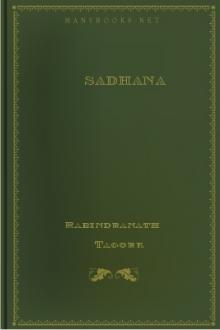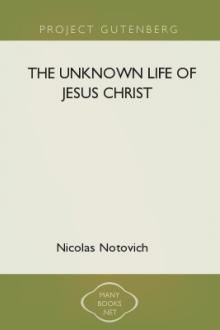Sadhana - Rabindranath Tagore (book club suggestions txt) 📗

- Author: Rabindranath Tagore
- Performer: -
Book online «Sadhana - Rabindranath Tagore (book club suggestions txt) 📗». Author Rabindranath Tagore
This joy, whose other name is love, must by its very nature have duality for its realisation. When the singer has his inspiration he makes himself into two; he has within him his other self as the hearer, and the outside audience is merely an extension of this other self of his. The lover seeks his own other self in his beloved. It is the joy that creates this separation, in order to realise through obstacles of union.
The amritam, the immortal bliss, has made himself into two.
Our soul is the loved one, it is his other self. We are separate; but if this separation were absolute, then there would have been absolute misery and unmitigated evil in this world.
Then from untruth we never could reach truth, and from sin we never could hope to attain purity of heart; then all opposites would ever remain opposites, and we could never find a medium through which our differences could ever tend to meet. Then we could have no language, no understanding, no blending of hearts, no co-operation in life. But on the contrary, we find that the separateness of objects is in a fluid state. Their individualities are even changing, they are meeting and merging into each other, till science itself is turning into metaphysics, matter losing its boundaries, and the definition of life becoming more and more indefinite.
Yes, our individual soul has been separated from the supreme soul, but this has not been from alienation but from the fullness of love. It is for that reason that untruths, sufferings, and evils are not at a standstill; the human soul can defy them, can overcome them, nay, can altogether transform them into new power and beauty.
The singer is translating his song into singing, his joy into forms, and the hearer has to translate back the singing into the original joy; then the communion between the singer and the hearer is complete. The infinite joy is manifesting itself in manifold forms, taking upon itself the bondage of law, and we fulfil our destiny when we go back from forms to joy, from law to the love, when we untie the knot of the finite and hark back to the infinite.
The human soul is on its journey from the law to love, from discipline to liberation, from the moral plane to the spiritual.
Buddha preached the discipline of self-restraint and moral life; it is a complete acceptance of law. But this bondage of law cannot be an end by itself; by mastering it thoroughly we acquire the means of getting beyond it. It is going back to Brahma, to the infinite love, which is manifesting itself through the finite forms of law. Buddha names it Brahma-vihara, the joy of living in Brahma. He who wants to reach this stage, according to Buddha, “shall deceive none, entertain no hatred for anybody, and never wish to injure through anger. He shall have measureless love for all creatures, even as a mother has for her only child, whom she protects with her own life. Up above, below, and all around him he shall extend his love, which is without bounds and obstacles, and which is free from all cruelty and antagonism. While standing, sitting, walking, lying down, till he fall asleep, he shall keep his mind active in this exercise of universal goodwill.”
Want of love is a degree of callousness; for love is the perfection of consciousness. We do not love because we do not comprehend, or rather we do not comprehend because we do not love. For love is the ultimate meaning of everything around us.
It is not a mere sentiment; it is truth; it is the joy that is at the root of all creation. It is the white light of pure consciousness that emanates from Brahma. So, to be one with this sarvanubhuh, this all-feeling being who is in the external sky, as well as in our inner soul, we must attain to that summit of consciousness, which is love: Who could have breathed or moved if the sky were not filled with joy, with love? [Footnote: Ko hyevanyat kah pranyat yadesha akaca anando na syat.] It is through the heightening of our consciousness into love, and extending it all over the world, that we can attain Brahma-vihara, communion with this infinite joy.
Love spontaneously gives itself in endless gifts. But these gifts lose their fullest significance if through them we do not reach that love, which is the giver. To do that, we must have love in our own heart. He who has no love in him values the gifts of his lover only according to their usefulness. But utility is temporary and partial. It can never occupy our whole being; what is useful only touches us at the point where we have some want. When the want is satisfied, utility becomes a burden if it still persists. On the other hand, a mere token is of permanent worth to us when we have love in our heart. For it is not for any special use. It is an end in itself; it is for our whole being and therefore can never tire us.
The question is, In what manner do we accept this world, which is a perfect gift of joy? Have we been able to receive it in our heart where we keep enshrined things that are of deathless value to us? We are frantically busy making use of the forces of the universe to gain more and more power; we feed and we clothe ourselves from its stores, we scramble for its riches, and it becomes for us a field of fierce competition. But were we born for this, to extend our proprietary rights over this world and make of it a marketable commodity? When our whole mind is bent only upon making use of this world it loses for us its true value. We make it cheap by our sordid desires; and thus to the end of our days we only try to feed upon it and miss its truth, just like the greedy child who tears leaves from a precious book and tries to swallow them.
In the lands where cannibalism is prevalent man looks upon man as his food. In such a country civilisation can never thrive, for there man loses his higher value and is made common indeed. But there are other kinds of cannibalism, perhaps not so gross, but not less heinous, for which one need not travel far. In countries higher in the scale of civilisation we find sometimes man looked upon as a mere body, and he is bought and sold in the market by the price of his flesh only. And sometimes he gets his sole value from being useful; he is made into a machine, and is traded upon by the man of money to acquire for him more money.
Thus our lust, our greed, our love of comfort result in cheapening man to his lowest value. It is self deception on a large scale. Our desires blind us to the truth that there is in man, and this is the greatest wrong done by ourselves to our own soul. It deadens our consciousness, and is but a gradual method of spiritual suicide. It produces ugly sores in the body of civilisation, gives rise to its hovels and brothels, its vindictive penal codes, its cruel prison systems, its organised method of exploiting foreign races to the extent of permanently injuring them by depriving them of the discipline of self-government and means of self-defence.
Of course man is useful to man, because his body is a marvellous machine and his mind an organ of wonderful efficiency. But he is a spirit as well, and this spirit is truly known only by love.
When we define a man by the market value of the service we can expect of him, we know him imperfectly. With this limited knowledge of him it becomes easy for us to be unjust to him and to entertain feelings of triumphant self-congratulation when, on account of some cruel advantage on our side, we can get out of him much more than we have paid for. But when we know him as a spirit we know him as our own. We at once feel that cruelty to him is cruelty to ourselves, to make him small is stealing from our own humanity, and in seeking to make use of him solely for personal profit we merely gain in money or comfort what we pay in truth.
One day I was out in a boat on the Ganges. It was a beautiful evening in autumn. The sun had just set; the silence of the sky was full to the brim with ineffable peace and beauty. The vast expanse of water was without a ripple, mirroring all the changing shades of the sunset glow. Miles and miles of a desolate sandbank lay like a huge amphibious reptile of some antediluvian age, with its scales glistening in shining colours. As our boat was silently gliding by the precipitous river-bank, riddled with the nest-holes of a colony of birds, suddenly a big fish leapt up to the surface of the water and then disappeared, displaying on its vanishing figure all the colours of the evening sky. It drew aside for a moment the many-coloured screen behind which there was a silent world full of the joy of life. It came up from the depths of its mysterious dwelling with a beautiful dancing motion and added its own music to the silent symphony of the dying day.
I felt as if I had a friendly greeting from an alien world in its own language, and it touched my heart with a flash of gladness.
Then suddenly the man at the helm exclaimed with a distinct note of regret, “Ah, what a big fish!” It at once brought before his vision the picture of the fish caught and made ready for his supper. He could only look at the fish through his desire, and thus missed the whole truth of its existence. But man is not entirely an animal. He aspires to a spiritual vision, which is the vision of the whole truth. This gives him the highest delight, because it reveals to him the deepest harmony that exists between him and his surroundings. It is our desires that limit the scope of our self-realisation, hinder our extension of consciousness, and give rise to sin, which is the innermost barrier that keeps us apart from our God, setting up disunion and the arrogance of exclusiveness. For sin is not one mere action, but it is an attitude of life which takes for granted that our goal is finite, that our self is the ultimate truth, and that we are not all essentially one but exist each for his own separate individual existence.
So I repeat we never can have a true view of man unless we have a love for him. Civilisation must be judged and prized, not by the amount of power it has developed, but by how much it has evolved and given expression to, by its laws and institutions, the love of humanity. The first question and the last which it has to answer is, Whether and how far it recognises man more as a spirit than a machine? Whenever some ancient civilisation fell into decay and died, it was owing to causes which produced callousness of heart and led to the cheapening of man’s worth; when either the state or some powerful group of men began to look upon the people as a mere instrument of their power; when, by





Comments (0)